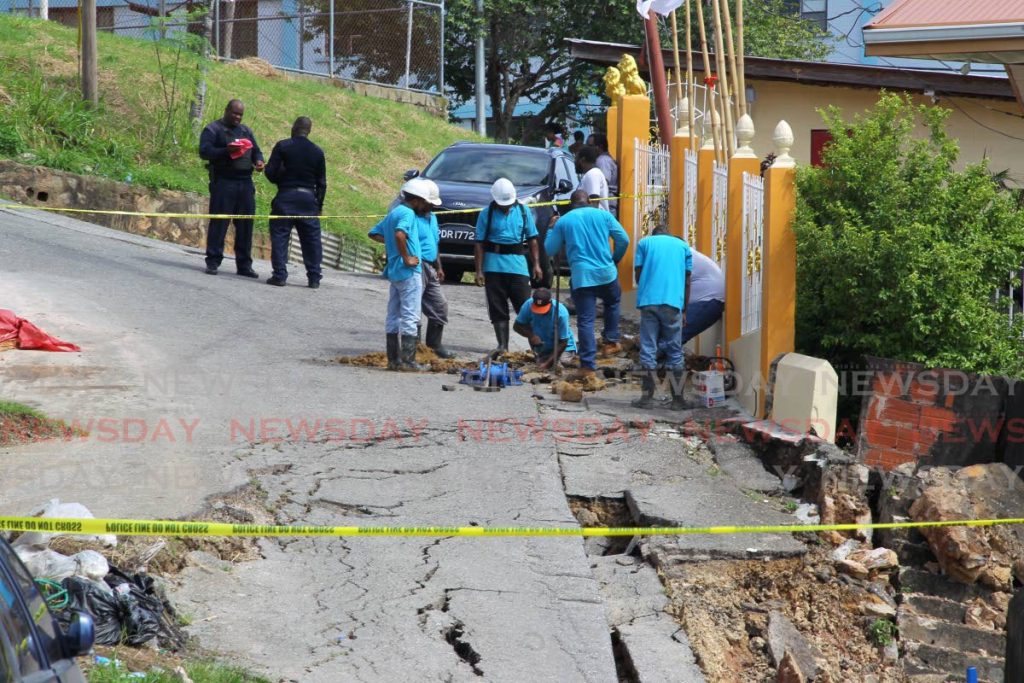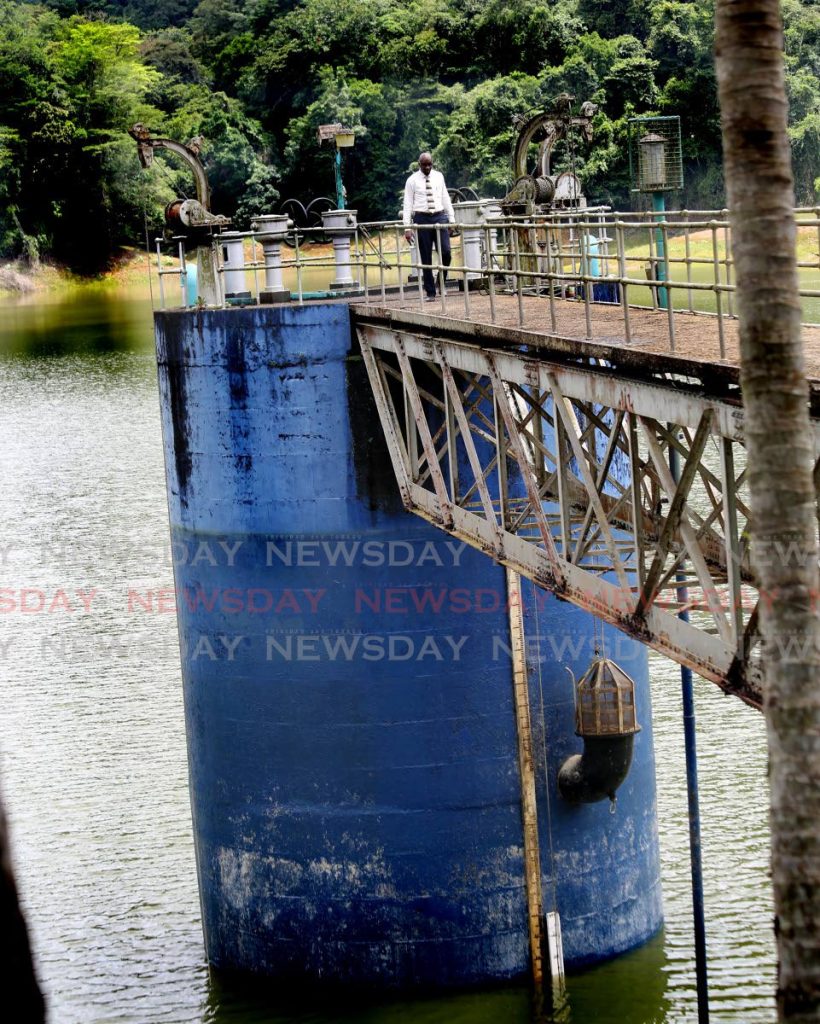WASA's Christmas challenge, faulty pumps affect water supply

AFTER complaints of no water supply on Christmas Day in areas like El Dorado, Cascade and Arima, Public Utilities Minister Robert Le Hunte blamed this on faulty pumps, which were due to be rectified by Friday. "Murphy's Law was very active over Christmas," he told Sunday Newsday, referring to the witticism that if something can go wrong it will.
"Last Friday (December 20) two important pumps from the North Oropouche booster station went down and were not repaired until Monday because we needed some specialist parts.
"Then there were more mechanical problems with pumps and this affected most areas in east Trinidad."
Overall, some areas got relief by Monday, others were alleviated by Thursday night, and all other areas were to be rectified by Friday.
A notice on WASA's website on Tuesday had named affected areas such as Sangre Grande, Maloney, La Horquetta, Guaico/Tamana and Five Rivers.
Sunday Newsday asked if WASA should be better prepared by keeping parts on hand.
"It would be an ideal world to have a well-stocked inventory."
Le Hunte said this was not so in reality as WASA was "a cash-strapped organisation," with a fair sum of money owed due to be collected.
"WASA is a utility in transition, with a lot of legacy issues, including cash management. You also have an ageing infrastructure – not just pipelines, but some pumps too."
Le Hunte generally reckoned TT's water challenges could be fixed by better management of the volumes it already has.
He said WASA has seven or eight levers or pillars which need addressing by a holistic plan. These are interconnectivity, storage, metering, infrastructure, consumption levels, leaks and management. "We have been dealing with all of these simultaneously."
He lamented that too often in the past, WASA has had a piecemeal approach.
"The leaks are about ageing pipelines, but you also have to fix the pressure management system, otherwise the leaks will just come back when you increase the pressure."
By way of example, if piping water to Goodwood Park, he said, one must calculate whether to start to pressurise the water from Caroni or from Carenage. "You can't run pressure through the whole length of the pipe," Le Hunte said.
Sunday Newsday asked if WASA's campaign for the public to save water was succeeding. "I don't have any empirical evidence but anecdotal. I feel a heightened and deeper sense of awareness by people being more mindful of how they use water in their house. We have been seeing our dams rising. I think our campaign has been working." He said people have contacted him to complain about their neighbours wasting water by washing cars and watering their plants.
Le Hunte reiterated that restrictions on activities such as power-washing are still in effect. "We are still into water rationing and are under water watch. All issues about using your hose are still in effect. People could still be charged if identified for an excess use of water."
He said the fines are "a bit low and need reviewing." The WASA Act (section 49 (1)) says in times of a serious deficiency of water WASA may for as long as needed prohibit or restrict the use of its supply for watering private gardens or washing private motor cars by hosepipe. A breach brings a fine of $750 on summary conviction, plus $75 each day the offence continues (section 83.) However the WASA website offers a Request for Exemption from Water Restrictions Form where an applicant must state the purpose, water volume, days, hours and period sought for exemption, and if applicable supporting documents from the relevant public health department.
Sunday Newsday otherwise learnt that WASA police have been active in charging individuals for wasting water.
Asked if industrial users were also asked not to waste water, Le Hunte replied they were unlikely to be wasteful as they are charged much higher rates than other users to buy their water, at $12 per cubic metre. "In conservation everybody needs to play their part, but they pay a very expensive cost so they are very prudent in their use of water."
Le Hunte said often people point fingers at each other when in fact overall in TT water consumption is fairly high.
"It does not mean that because WASA has leaks, consumption is to be unchecked. Even with the leaks, our excessive use of water is from our habits and leaks in our homes."
Le Hunte said TT's consumption of 92 gallons per person per day was way over the world average of 40 gallons.
He said in TT, while some people regrettably do not get water, others use too much.
Le Hunte said the cumulative shortfall in rainfall for the past six months was about 204 millimetres, equivalent to a month of wet-season rainfall.
"Less rain fell this rainy season than the long-term average."
Le Hunte added that April-June was one of TT's worst dry periods in 72 years.
"The reservoirs were 20 per cent lower than the normal levels at the start of the rainy season."
He hoped that in January and February the shortfall in the reservoirs would be made up.
"Prudent management by all is still important."
Le Hunte said the Caroni reservoir was supposed to produce 70 million gallons per day but was only giving 62 million gallons.

Likewise Navet's ideal of 20 million gallons was reduced to 15 million, and Hollis Dam's eight million ideal was actually five million.
"We need to manage our Carnival season in a very prudent way. We are predicting January and February to be rainier days, but I don't know if it will happen or not, given climate change and all that's happening."
He said much work has been done to improve interconnectivity, to use pumps and pipes to take water from one place to another, while reducing leaks.
"But it is not just about waving a magic wand. It's a complex thing. It's not just about fixing one thing, like raising tariffs but a substantial fix going forward."
Le Hunte reckoned that under his tenure the water supply had got "slightly better." He said $1.4 billion spent under the former government on a water project that had produced "not a drop" could instead have fully funded a national water-metering campaign.
Pledging his commitment to supply water to the people of TT, Le Hunte said, "I am confident it will get better in 2020."
In view of climate-change, Sunday Newsday asked if a bigger water supply could be gained via desalination or building more reservoirs. "Desalination is one of the most expensive sources of water. I don't see desalination as the solution for TT. There are lots of other, cheaper ways to produce water."
Some isolated areas could see new production by way of new wells. However, Le Hunte emphasises that TT's problem is not one of water production but rather distribution which involves issues of leakage and interconnectivity. "Per capita, we are one of the largest water producers," he assured. TT produces 178 gallons per capita per day, ahead of 65 for Jamaica and 66 for Barbados. "So our problem, why people don't have water, is not primarily because of the production of water. What we need to do is ensure we utilise the 240 million gallons a day we produce and make sure it reaches the people better." He said a focus is needed on leak management and storage. "Our storage is way below the international standard. We need to improve it."
Le Hunte said the number of leaks in pipelines in TT had been reduced from 3,000 to 1,000 using WASA workers not contractors. He said TT's water storage capacity at present is below international standards. "We have been in talks with the IDB and other international agencies to determine a plan and a funding mechanism to deal with these issues. We've been working incrementally on all the pillars but it all needs financing." Le Hunte said, "We invested in booster stations, so we can now move water around a lot more than before." This measure means water from Caroni reservoir can be sent down to Barrackpore, and so relieve stress when the Navet reservoir is not up to par. "I'm actively looking for solutions and we are doing things to make the situation better. We are working on a plan to deal with this thing once and for all."


Comments
"WASA’s Christmas challenge, faulty pumps affect water supply"